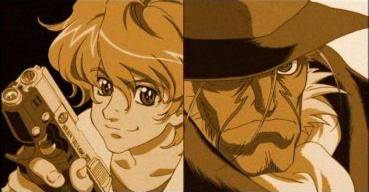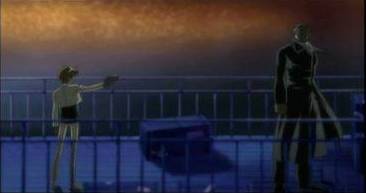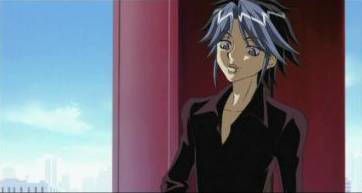|
Heat
Guy J, Volume 1 is released on the 27th of March by
Manga Entertainment. It markets itself as a "buddy cops"
story, but bears very little similarities to other films
and shows of the genre – one that is, admittedly, mostly
American.
The
action takes place in the futuristic, yet familiar, city
of Judoh. Our young protagonist, Daisuke, is a member of
the short-staffed and low-budget City Safety Management
Agency, which was created to handle growing Mafia activity
inside the city. He's partnered with the titular J, an android.
Together, they aim to prevent crimes before they happen.
The only other member of their Agency is the cute but put-upon
secretary, Kyoko.
This
first volume collects the first eight episodes over two
discs, something that I was pleasantly surprised by (after
seeing Ghost
in the Shell: SAC 2nd Gig, which filled each disc
with the same content, but with different audio types).
The series opens with the funeral of mob boss Don Leonelli,
and shows the rise to power of his insane son, Clair. This
leads to altercations between the Leonelli family and the
other crime syndicates inhabiting the city.

Along
the way, Daisuke and J deal with criminals such as illegal
immigrants (and illegal androids), escaped convicts surgically
altered to look like animals, and various other problems
that occur within the city – all against the backdrop of
a full-scale gang war between the various crime families
of Judoh.
Stylistically,
Heat Guy J is excellent. It's certainly
got it where it counts: explosive gun and pyrotechnic action,
fluid martial arts battles (though usually between J and
other androids), and some great car chases. The city is
very vibrant, both in the colouration used and in its inhabitants,
a truly mixed bag of "ordinary" people going about their
lives, shady Mafia hitmen, prostitutes, market stall owners,
and a ten-year-old photographer trying to make a living
for herself and her sick mother.
While
watching the episodes, I couldn't help but notice the various
similarities and borrowed concepts that Heat Guy
J's characters appear to integrate. Daisuke, in
many ways, channels Cowboy Bebop's Spike Spiegel
in both his attitude and some of his design elements. J,
to me, has the same craggy features as Wolverine of the
X-Men. The secretary, Kyoko, isn't from any series
in particular, but any animé fan worth his salt could
identify the stereotypical pink-haired, cute token girl
character. Finally, the evil and insane Clair Leonelli is
a dead ringer for Escaflowne's resident evil crazy,
Dilandau.
While
I can't fault Heat Guy's execution, I do
have some complaints to make over its story structure. I
mentioned above that J is the title character, but at times
I found myself wondering whether that was strictly true.
His partner Daisuke seems to do most of the work – researching
the crimes, schmoozing with the city residents, giving orders
to J and even telling the city's police department what
to do. For the most part, J is relegated to calling Daisuke
when new information appears, and explaining key parts of
the story to him – and, by association, explaining them
to us as well. So, who is the main character – J or Daisuke?
Is J just a gimmick?

Heat
Guy J, as a series, likes to take three minutes
aside to make sure the viewer understands what's going on
in the story (through J's expositions), or – in the case
of Daisuke – to soapbox beliefs about subjects such as immigration
and the use of petroleum. These soapboxes often come on
abruptly, and then seem out of place. It's almost
excusable to be talked down to in such a way – I've seen
other series that use the same methods – but if Heat
Guy wants to be taken seriously, it needs to trust that
its audience are not stupid and can work out the plot.
In
the animation department, I did like the style of the vehicles
– all apart from Daisuke's unnecessarily convoluted motorcylce,
which is rendered in CG and looks quite out of place. The
environments, especially the grassy parklands, remind me
of Digimon Tamers; greens and greys are used to great
effect. As for the buildings – well, the city itself is
almost indistinguishable from modern American or Japanese
citys, replete with skyscrapers fading down to market-stall
slums. They might as well have set it in futuristic New
York or Tokyo. The only other problem that I felt detracted
from the look of the series was the use of CG – which, like
Daisuke's motorcycle, is often used pointlessly, such as
with shots of the city and of J that could probably just
as easily be rendered by hand.
The
music is uninspired; all the usual dynamic action/battle
tracks are present. The only remarkable elements are the
pieces that sound vaguely Italian in origin, or at least
the "faux-Italian" guitars that seem to follow Mafia characters
around in all TV shows and movies. The English dubbing,
as far as I can tell, has no faults and is just as listenable
as the original Japanese language track.
Overall,
I found Heat Guy J to be a little generic
in terms of both story and style. While most animé
fans will like the action sequences, quite frankly, they're
the best element of the series. The excessive exposition
– while not quite as heavy or complicated as Ghost in
the Shell: SAC – only serves to pad out the plot and
extend it for more time than it's worth. The Mafia backstory
is well laid out, though.
The
anamorphic 16:9 transfer here is pretty standard for recent
animé releases, being clear, with good colour reproduction
and reasonably sharp , although the picture never leaps
from the screen. There are some visible compression artefacts
in the darker scenes.

The
soundtrack is available as either the original Japanese
or an English dub, each in either Dolby stereo 2.0, Dolby
surround 5.1 and DTS. The DTS mix is much louder
and more inclusive and definitely the one to go for if you
have that option, and the Japanese mix seems to have the
edge over the English dub.
There
are no special features on the discs themselves, which I
was quite disappointed about. The DVDs are presented in
a special slip case with a poster booklet, which doesn't
really make up for the lack of extras... but you can't always
have everything you want.
|